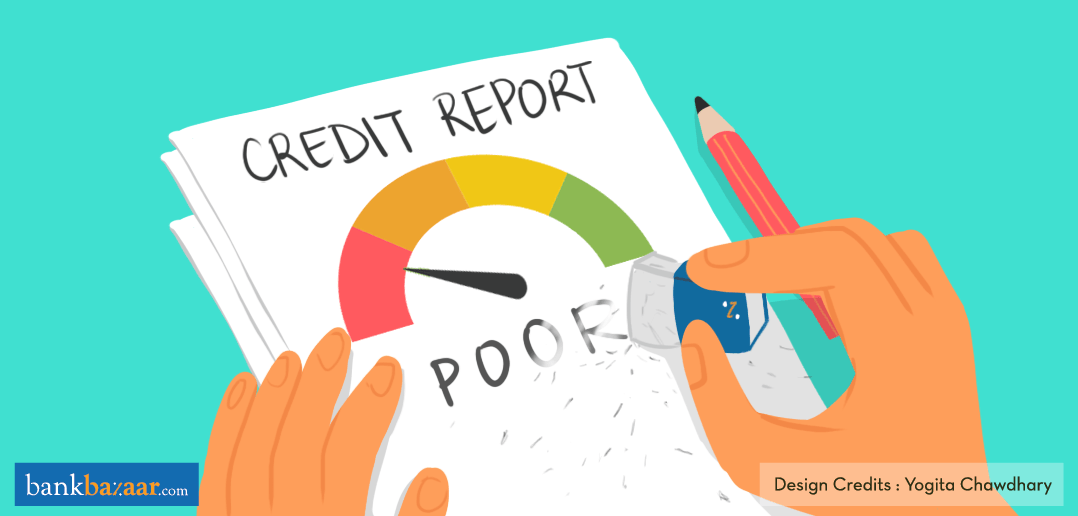If a mountain of debt is giving you sleepless nights, here’s how you can clean up your credit and raise your Credit Score.

While money experts and handbooks can’t stress enough about the importance of staying debt-free your entire life, it’s perhaps an impractical goal to aim for unless you have millions stashed away. Buying a home for most people will involve taking out a Home Loan. In other words, taking on debt that will last you at least a good 10 years. While there’s nothing wrong in taking out a loan, what you’ll need to ensure at all times is that you’re making your loan repayments on time and in full.
A financial emergency has the potential to deplete all your savings and leave you financially crippled. Even if you have an emergency fund earmarked for these situations, it may still not be enough to meet your sudden financial needs. Taking out a loan in these times is the most sensible thing to do. The thumb rule to follow while taking out a loan is to keep your debt at an acceptable level. However, if you have a mountain of debt and a Credit Score that’s in the dumps, here’s how you can go about cleaning up your credit.
Additional Reading: Is Prepaying Your Personal Loan A Good Idea?
Step 1: Review Your Credit Score
A Credit Score is a three-digit number that banks use to assess your creditworthiness. When you apply for a loan or a Credit Card, your Credit Score is one of the foremost things that banks will check to determine your eligibility for a loan. A good Credit Score has more going in your favour than you think:
- It boosts your chances of approval when you apply for a loan or a Credit Card
- It makes you eligible for a higher loan amount when you’re taking out a Car Loan, Home Loan, Education Loan or a Personal Loan.
If you have a mountain of debt weighing down on you, check how your existing debts have affected your Credit Score. Your Credit Score is impacted by a whole lot of factors like your repayment history, your credit utilisation ratio, your credit history etc.
Psst…you can check your latest Credit Score for FREE by clicking here
Step 2: Delineate Your Good Debt From The Bad
Now you have a mountain of debt that’s giving you sleepless nights, but some of that debt may not be entirely bad. After reviewing your Credit Score, the next step in your list should be to delineate your good debt from the bad. Good debts include investments that offer you returns beyond the monetary value of the debt and its repayments. Examples of this are property or assets like stocks, bonds, gold etc. Some might also consider an Education Loan as a form of good debt since it can boost your earning power thereby making the debt worth it.
On the other hand, bad debt is like a sunk cost that holds no potential to generate income or returns for you in the future. Incurring bad debt means taking on loans that have the potential to tank your Credit Score and throw your repayment ability all out of whack.
Additional Reading: 5 Essential Personal Loan Know-Hows
Step 3: Create A Plan Of Action
Paying off all your debts at once may seem like an impossible task, and more often than not, it is. That’s why setting up a debt repayment schedule can help you pay off all your debts in a sustainable and manageable way. When you’re setting up your repayment schedule, start by making a list of all your debts and rank them in the order you want to pay them off. One way to prioritise your debts is to rank them in order of decreasing interest rates and pay them off one by one.
Tackling one debt at a time is less overwhelming and prevents you from paying more in clearing your debt since you pay less interest over time instead of spreading your money over several debts at once.
Additional Reading: Things You Should Know Before Co-Signing A Loan For Someone Else
Step 4: Consider A Debt Consolidation Loan
Debt Consolidation loans are nothing but low-interest Personal Loans that you can use to consolidate all your unsecured debts into one lower interest loan. Debt Consolidation loans help you manage your repayments better as you no longer have to keep track of multiple repayments. They also help you pay off all your debts at a much lower interest rate than making multiple high-interest repayments.
Step 5: Stay Consistent
Additional Reading: Should You Use A Personal Loan For Home Renovations?
The thumb rule to follow when you’re on the path of clearing all your debts is to stay consistent with your repayments and paying them in full and on time, all the time. Managing debt is a learning process, so even if it looks like it will take forever to clear, the idea is to never give up. With the right attitude and repayment schedule, you can chip away at the outstanding amount that you owe.
Looking for a Personal Loan with a lower interest rate? Check out Personal Loans starting from 10.50% with contactless KYC by clicking the button below: